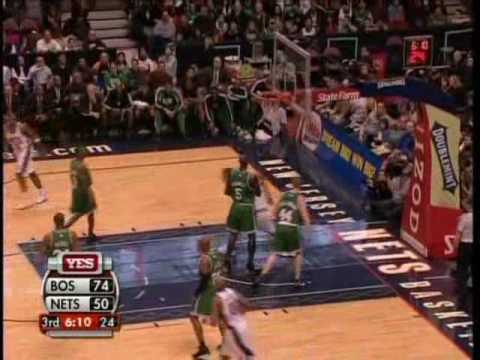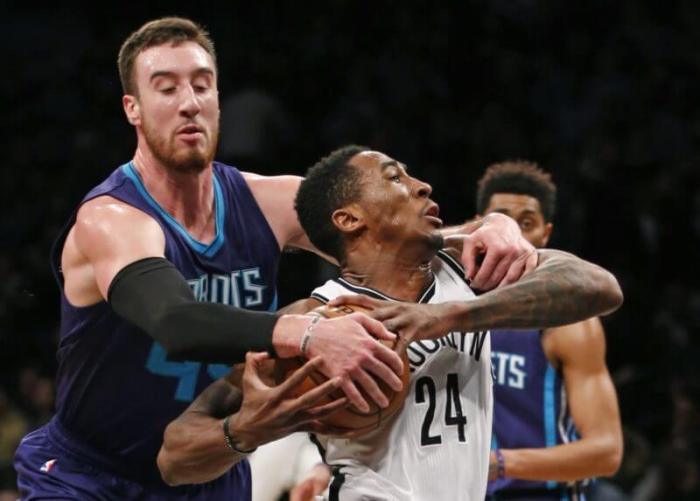The New Jersey Nets announced this weekend that Brook Lopez, just five games played on the season as a result of various injuries, wouldn’t play another game this season. They were shutting him down, ensuring that he’d rest his ankle and foot injuries enough to return next season with 100% health. With the Nets far out of the playoff race, it didn’t make any sense to play him, risking he’d exacerbate his already dangerous injuries.
Lopez is a restricted free agent this offseason, and teams will come calling. It’s possible that his recent injuries will scare enough teams away from offering him substantial money, keeping him in Brooklyn. It’s also possible that some team will throw an ungodly amount of money at him — given how some centers have gotten paid in the past few seasons, it wouldn’t be surprising — and the next time we see Brook in Brooklyn will be in an away uniform.
After 246 consecutive games played and 239 consecutive starts, this season became what’s hopefully an anomaly in what’s already a strange career.
He fell to New Jersey on draft night, thanks to Michael Jordan’s ludicrous idea that D.J. Augustin was more valuable. He never had a chance at the Rookie of the Year award — Derrick Rose was simply too exciting and too nationally covered, and the somewhat imagined narrative of a rookie point guard leading his team to the playoffs was too enticing to ignore — but Lopez’s quiet, consistent, startling effectiveness grew on me his entire rookie season.
He won the starting spot just seven games in, with a coach that had often had a difficult time finding rotation space for rookies. He picked up 25 points and 9 rebounds in his first start, a victory. He recorded five double-doubles in his first 11 starts. He grabbed 20 rebounds in a game. He recorded eight 20-10 games. He outplayed Dwight Howard in one of their matchups. His best overall statline came against the Knicks: just five rebounds, but eight assists, three steals, three blocks, and 23 points in a victory.
And for three years, I watched Brook Lopez evolve. Firstly as a highly efficient, old-school, back-to-the-basket big man, a good rebounder with surprisingly advanced footwork in the post, a hook shot Derrick Favors could only dream of, an up-and-under move that most centers don’t learn consistently in their entire careers, the touch at the rim to hit difficult shots, and the length to contest shots at the rim. He wasn’t a great defender, but his enormous length allowed him to alter enough shots to break the Nets’ rookie record for blocked shots. He wasn’t a great defender, but he was capable, and had room to grow.
He wasn’t a soft scorer. He could bully the hell out of you in the post. He could confound you, contort you, force you leaning one way on defense until he slipped past you in the other direction. He had a soft, high hook with either hand, released seemingly well above the rim and far from the blockosphere. His midrange game was there, but he didn’t start there. He only stepped out to remind you that he could beat you there, too, and you’d better be careful. He was a member of a losing team, but he cared for his franchise and his teammates. He wasn’t a commodity, he was the future.
Just watch how the Celtics bench reacts when Lopez tears through the paint on this dunk. It’ll never make a top-10 highlight reel, but his tenacity and ability commanded respect of a visceral nature. He destroyed them. That was how I felt, every time Lopez beat a defender in the post, every time he dunked over or through someone, every time he showed off just a sliver of that mean streak that bubbled under the surface. I had the immediate, Marvian reaction of “YES!” as well as the growing, confident knowledge that Brook would become a star in this league. Lopez gave us hope. He’d anchor the paint for the next decade. It started on draft night, but it didn’t take off until…
Well, it still hasn’t taken off. This was supposed to be that season. This was the season where Lopez could finally put it all together, free from the constraints of mononucleosis. He’d finally get the chance to shake so many labels: the “can’t rebound” label (I firmly believe he’s closer to the 15.8% rebound rate guy he was his rookie season than the 10% form last year), the “impossible to win with him as your center” label (which I’ve heard from a few places), the “soft” label (silly, in part due to his insistence on playing through pain and sickness), and so many more. This was the time when he’d play with one of the best point guards in the league, become a terror in the pick-and-roll, and not have to create such an ungodly amount of his own offense. He’d attack the rim more because that space was there, because teams had to space their defense to pressure Deron Williams and the host of shooters surrounding them. This was the year Lopez was supposed to make people realize that he’s not just a consolation prize for Dwight Howard, but a force unto himself.
Writing this feels like a bit of a eulogy. And it’s not. Brook isn’t dead, and his career isn’t over. He’s still got his best seasons ahead of him, injury issues notwithstanding. But in the past two years, his place in basketball has shifted. He’s no longer the young, solid, budding-with-20-10-potential big man. To many I’ve spoken to, he represents a paradox; a very talented player you can’t win with. He’s not a Tyson Chandler-type defender. He’s an anemic rebounder. His biggest asset (his ability to give you points) can be replicated elsewhere, but his biggest weakness (covering the paint against drives and cutting off lanes to the basket) can’t. A shooting guard can score, but he can’t man the middle. I do think Lopez can become that big man one day, or at least a decent enough replica, but that stigma applies. And this year, because basketball doesn’t live in a fair world, Brook couldn’t provide a counter-argument to his prosecution.
Fittingly, after a lost season filled with promise, the only words left to offer on Brook Lopez come in a phrase that’s a Brooklyn sports staple: wait ’til next year.


















